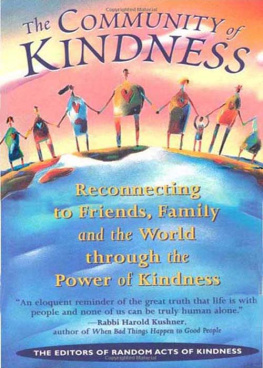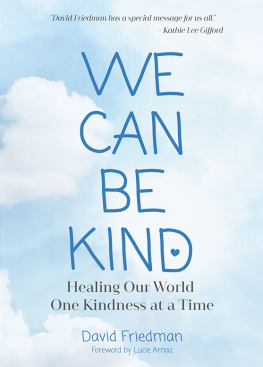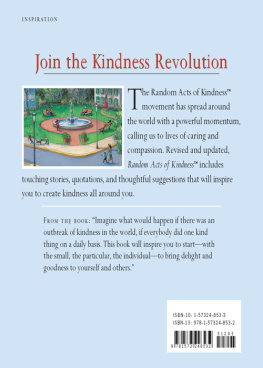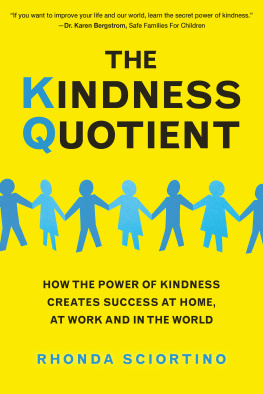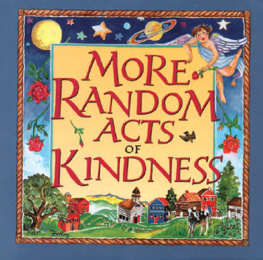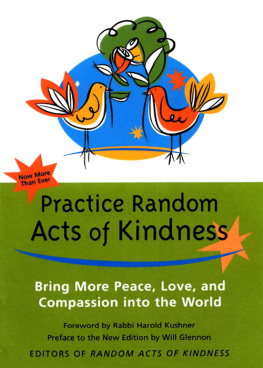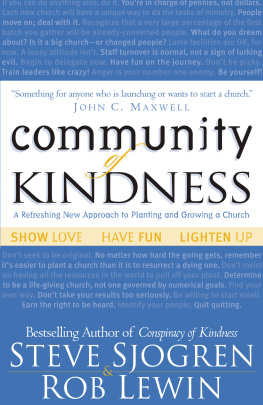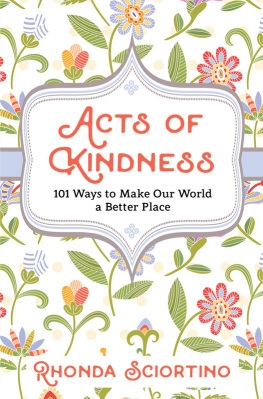
Praise for
The Community of Kindness
Kindness, like love, is eternal, and when we live it in community we weave a web of sacred connection. This lovely book is a testament to that connection, reminding us once again that it is palpable, exquisite, and unending.
Daphne Rose Kingma, author of Coming Apart, True Love, The Future of Love
Bravo! What a beautiful gift to the world from the editors of Conari Press! The Community of Kindness, addressing our longing for connection, touched me deeply. It inspired and gave me solid ideas for inclusive, 21st-century community building.
Joan Steinau Lester, Ed.D., partner, The Equity Consulting Group and author of Taking Charge: Every Woman's Action Guide to Personal, Political and Professional Success

Copyright 1999 Conari Press
All Rights Reserved. No part of this book may be used or reproduced in any manner whatsoever
without written permission, except in the case of brief quotations in critical articles or reviews. For information, contact: Conari Press, 2550 Ninth Street, Suite 101, Berkeley, CA 94710-2551.
Conari Press books are distributed by Publishers Group West
Cover Illustration: Kurt Vargo
Cover art direction: Ame Beanland
Cover and interior design: Suzanne Albertson
ISBN: 1-57324-148-2
Library of Congress Cataloging-in-Publication Data
The community of kindness: reconnecting to friends, family, and the world through the power of kindness / the editors of Random acts of kindness.
p. cm.
ISBN 1-57324-148-2 (tradepaper)
1. kindness. 2. Interpersonal relations.
I. Conari press II. Random acts of kindness.
BJ1533.K5C65 1999 98-45502
303.3dc21 CIP
Printed in the United States of America on recycled paper.
99 00 01 02 QUEB 10 9 8 7 6 5 4 3 2 1
www.redwheelweiser.com
www.redwheelweiser.com/newsletter
Past the seeker as he prayed, came the
crippled and the begger and the beaten.
And seeing them, the holy one went down
into a deep prayer and cried, Great God,
how is it that a loving creator can see such things and yet do
nothing about them?
And out of the long silence, God said,
I did do something. I made you.
SUFI TEACHING STORY
The COMMUNITY of KINDNESS
1
Longing for Connection
One of the truths of our time is this hunger deep in people all over the planet for coming into relationship with each other.
M. C. RICHARDS
W e all want meaningful connections to those we love, to the places we live and the people with whom we share a neighborhood, a town, a country, a world. We want to feel that we're seen, known, and appreciated; we want to contribute, to make a difference in the world. We want to feel part of a larger whole, that our individual lives aren't, in the words of Daphne Rose Kingma, like a cruel joke. In a word, we long for community.
And yet, such connections seem elusive, particularly now. We are so busy, we barely know our fellow apartment-dwellers, much less the old lady in the house on the corner. And when we do reach out, it seems that within a few months, weor theyhave moved on to the next job, the next relationship, the next town.
Our world is changing, and life seems to be sweeping us along with it. After tens of thousands of years of slow, almost incremental development, we are suddenly at a point in history when change itself is the moving force, moving faster and faster beyond what we can comprehend, much less keep up with. The process of that change is often blazingly apparent: the gadgetry of modern living invades our days, the bright lights and screaming electronics providing ever-present background noise and distraction. There is an aura of almost electrical excitement in the atmosphere as we move from cars, planes, and Nordic tracks to our computers, microwaves, faxes, and e-mail. Our mastery over our physical surroundings has brought us to the doorway of incredible possibilities, and yet we know intuitively that it has come at a price. We are beginning to realize that the most pressing challenge we face today is not technological, not to build a better machine, but to grow up as a species, moving past our reckless adolescence and taking conscious responsibility for our behavior. We are also challenged to find new ways of being connected to one another and to the Earth itself.
It is a task we are ill prepared for. We have spent most of our history in the throes of adventure, exploring, expanding, inventing, and conquering. The practice of introspection, contemplation about the meaning, weight, and purpose of our existence, has been largely the province of academic and spiritual leaders. The rest of us have simply tried to make do, dealing as best we can with the challenges of daily life. The weightier decisions, the power and responsibility for bending the flow of history, were out of our grasp. This is no longer true, for one of the side effects of the world's growing acceptance of democracy combined with extraordinary advancements in communications technology has been the steady emergence of public opinion as the ultimate source of power.
Political leaders can still lead and persuade, but the days when they could bend a nation's direction to their wills are fast disappearing. World opinion has an increasingly deeper and more profound influence on the behavior of supposedly sovereign states. Slowly, almost outside of our range of perception, the beliefs and opinions of individuals all over the world are becoming not only more clearly articulated and understood, but more powerful.
With that increase in power comes a parallel increase in responsibility, and that too is something people are beginning to take more seriously. From the international grassroots movement to ban land mines to the extraordinary global environmental movement, individual people are assuming a greater degree of personal responsibility for worldwide issues and are acting on it to an extent unimaginable just a few decades ago. We are recognizing how interconnected we are, how much of a global community we can be, but we are uncertain what forms these connections will take.
That's because the rhythm and structure of what we know of community is centuries old. Our way of feeling connected to a place and to the people of that place has not changed significantly in the tens of thousands of years of organized human history, and now, seemingly suddenly and irrevocably, virtually every old form of community is collapsing all around us. Small towns are becoming big cities or are being swallowed up by even bigger cities; extended families are spread out across the land; ties of tribe, clan, and region have ceased to fulfill the comforting task of locating us intimately within a community. The bonds that once held us have been broken, and we are left with a disturbing unease, a sense of being cast adrift. We are no longer sure where we fit or where we can turn for comfort and a sense of belonging. In theory our community has expanded globally, but in the marrow of our bones most of us feel cut off and alone.
This is a modern human problem. For most of history, belonging to a community was taken for granted. Whether clan, tribe, small town, or big-city neighborhood, it was there people were born and raised, and it was within community that individuals struggled to find their place. The fact of community was a given; the fitting into it and the defining of the individuals within it were the issues. In our lifetimes, for the first time in history, the ground rules have shifted. We grow up with breathtakingly unlimited opportunity to find our own ways, but in increasing numbers we grow up outside the steady comfort of any true community; the absence of that all-encompassing caress leaves us feeling deeply disconnected.
Next page
